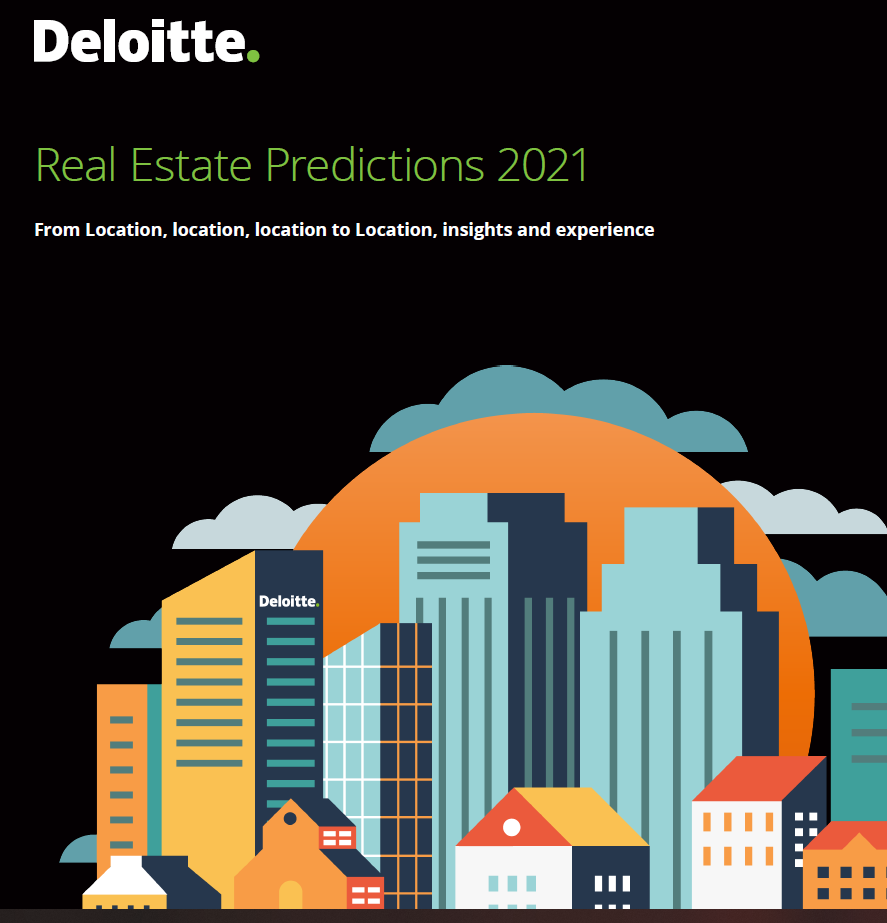Deloitte’s real estate industry forecasts, were developed by Deloitte’s real estate team in the Netherlands. They describe trends in the real estate market that may affect the sector in the short and medium term. This year’s report is a series of articles addressing issues such as the impact of climate change on real estate, diversity and integration of teams, remote working and many other aspects crucial for the real estate sector.

Prognosis No.1 – 5G technology as an enabler of new, more efficient ways of working
The year 2020 has turned all norms and standards upside down. In the midst of meticulous scrutiny of commonly accepted norms and behaviours, it is easy to overlook the significant infrastructural changes taking place in the meantime. We are currently experiencing another digital breakthrough – the mass deployment of 5G technology. It will become the ‘glue’ that connects all devices and locations, enabling us all to use new, more rational ways of doing things. The report answers the question of what impact this change will have on the property and construction sectors.
Prognosis No.2 – How to attract professionals in the real estate sector?
The pandemic has completely changed the nature of the interpersonal relationships that underpin the commercial real estate segment’s business. In this situation, skilled team members can play an important role in determining whether a company stays ahead of the competition or catches up as the business environment evolves. The report answers the question of how we can prepare for the challenges of talent acquisition in the real estate sector.
Prognosis No.3 – How to gain a competitive edge in the real estate sector with geospatial analytics using artificial intelligence?
Data analytics can rationalise decision-making in the real estate sector – from valuation, buying/selling of properties and contracting, negotiation and risk analysis to planning. In 2021, geospatial analysis using artificial intelligence will be of particular interest. Why? Because it’s a quick, simple and cheap way to develop address-accurate rent forecasts with the right level of transparency.
Prognosis No.4 – Innovative solutions and the construction sector in the shadow of the global crisis
We are witnessing a global health disaster and a worldwide economic collapse. At the same time, the pandemic has brought to light another well-known problem which may seem remote but whose scale poses a huge threat to humanity and has irreversible consequences. I am talking about global warming. If we want to avoid many of the consequences of global warming, we should accelerate our efforts now. The report answers the question of how digitalisation and innovative solutions can help the construction sector prepare for a sustainable future.
Prognosis No.5 – “Virtual office” and the commercial real estate sector
The proliferation of remote working in 2020 has significantly changed the function of the workplace in every company. All indications are that the hybrid working model has taken hold, with employees benefiting from a choice of working hours and days, and employers reviewing the demand for office space. The report answers the question of how property owners are responding to office virtualisation as one of the key elements of the ‘new normal’.
Prognosis No.6 – Real estate as a service: from “product and surface” to “system and service”
The real estate sector is undergoing a fundamental transformation of its operating model, enabled by the digitalisation and growth of the small property market. The report provides answers to the questions: what business model will ensure success in the future? What benefits can the real estate sector reap by leveraging technology? What is real estate as a service (REaaS)? What impact does it have on company strategy and performance?
Prognosis No.7 – How does social good affect real estate?
“ESG” is a commonly used acronym for the English words “environmental, social and governance”, under which environmental factors, social responsibility and corporate governance are included. ESG issues are an important consideration in business decisions around the world today. For example, real estate investors are increasingly focusing on sustainability. However, ESG can be much more important in the real estate sector. The report answers the question: how do you make ESG standards an important driver of value growth?
Prognosis No.8 – The rental housing sector – how to understand it?
One of the megatrends observed in the real estate sector is the increased demand for rental housing, especially in capital cities. The outbreak of the COVID-19 pandemic has further intensified this trend. At the same time, however, there is too little rental housing and those that are available are not in line with current needs, so a product needs to be developed to meet demand and offer new opportunities.
Prognosis No.9 – Optimising the use of office space and real estate
The COVID-19 pandemic has accelerated the implementation of new ways of working, which in turn will affect the use of office space. The report answers the questions: what does this mean for the real estate industry and its corporate clients? What new opportunities will arise? How do we prepare the real estate portfolio for a more agile future of work? There is no doubt that you need to act fast.
Prognosis No.10 – Protecting identity in the digital world
Protecting (proof of) identity is extremely important in our society. Especially in the digital world, identity theft or misuse is a major risk, and interactions and transactions in virtual reality have a serious impact on our lives in the real world. Self-Sovereign Identity (SSI) is about control over our digital identity.
